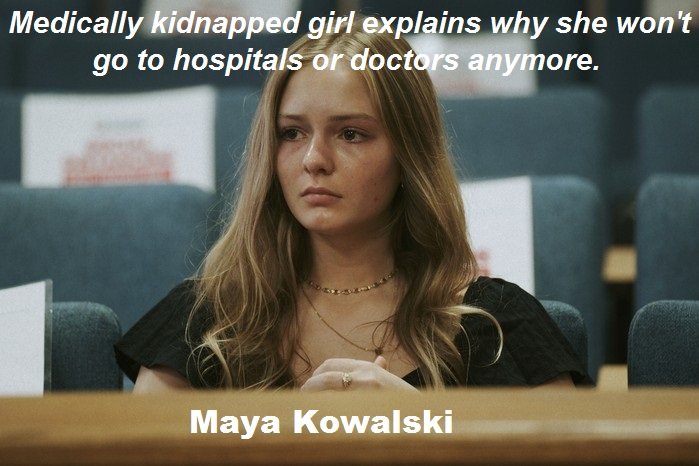by Brian Shilhavy, Health Impact News:

Last night I watched the new documentary that was released by Netflix last month (June, 2023), “Take Care of Maya.”
This is, by far, the best documentary I have ever watched that exposes the criminal enterprise allowed to operate in this country, and which I have been covering as a journalist for about a decade now, medical kidnapping.
Here is the Netflix trailer:
TRUTH LIVES on at https://sgtreport.tv/
The documentary shows the true story of the Kowalski family of Florida, a medical kidnapping horror story that we have covered in previous articles. See:
Florida Group Homes in Foster Care are Pimping and Sexually Trafficking Children
Has Florida Become the Top State in the U.S. for Medical Kidnapping and Child Trafficking?
The documentary was produced by Caitlin Keating, who also writes for People Magazine.
Here is an excerpt from People that was published just before the film was released on Netflix.
An Allegation of Munchausen by Proxy, a Mom’s Suicide, a Daughter’s Pain: ‘Take Care of Maya’ Exclusive Clip
Maya Kowalski tells PEOPLE how a hospitalization for her painful and rare neurological condition led to her mother’s suicide, ahead of the premiere of the new Netflix documentary
By Abby Roedel
Maya Kowalski was rushed to the ER at Johns Hopkins All Children’s Hospital in St. Petersburg, Fla., in the early morning of October 7, 2016. She had crippling stomach pain (“so severe, her knees were going up to her chest, and she was screaming,” says her father, Jack,) related to the rare neurological condition complex regional pain syndrome or CRPS.
The 17-year-old’s first memory was with her mom days later at the ICU. She kissed Maya on the forehead, told her she loved her, and they’d see each other the next day. “I never saw her again,” Maya says.
Maya’s mom, Beata, 43, had been accused of child abuse due to Munchausen syndrome by proxy, a mental disorder in which a caregiver fakes or causes symptoms to make a child look sick. She was immediately separated from her daughter.
In this exclusive clip for People from the new Netflix documentary Take Care of Maya (premiering this weekend at the Tribeca Film Festival and available to stream beginning June 19), Beata speaks with a parent advocate counseling her about how to get Maya back. The advocate says: “Beata, this is the thing you need to understand about these cases. They’re not fair. They don’t care about the evidence.”
In the ICU, Beata, trained as a registered nurse, told the doctors to administer a high dose of ketamine, the one treatment the Kowalskis and Maya’s doctor believed to be effective for her pain. The request raised concerns among the staff, and child protective services was called, which sent Dr. Sally Smith.
A court-ordered psychological evaluation eventually determined Beata did not have the illness. Still, Dr. Smith, a child abuse pediatrician who handled investigations for Pinellas County, a county with the highest rate in Florida of removing children from families under investigation, and the investigating team continued to push the case.
Less than a week after Maya checked into Johns Hopkins, she was placed in state custody and remained in the hospital away from her parents and her younger brother Kyle, now 16, for over three months. (Full article.)
Producer Caitlin Keating and director Henry Roosevelt were interviewed by The Wrap a few days ago, where they stated that they hear from other families with similar medical kidnapping stories as the Kowalskis, every single day.
‘Take Care of Maya’ Filmmakers Say They Hear From Families Every Day Who See Themselves in Kowalskis’ Medical Nightmare
When journalist Daphne Chen first wrote about the case, she heard from dozens of families in the same situation. Have you gotten a similar response to the documentary?
CK: There’s rarely an hour that goes by that we’re not getting a tweet, direct message, email, phone call or letter. It really shows you how widespread this problem is and how many people are experiencing something similar. People are saying that they saw themselves in this film in some way and the response has been overwhelming.
HR: We know that RNs and CPS workers are talking about it in classes and break rooms. So for us, it’s a positive thing, but it’s just the beginning of the conversation.
Would you do a follow-up documentary if the trial happens? And how much of your life is still about this case even if you’re not going to make another film about it?
CK: It took up a lot of our life for good reason for a long time. And if we’re not filming the trial, we will definitely be tuning in.
HR: Truthfully after we finished it, I don’t think it belongs to us anymore. I don’t even think it necessarily belongs to Netflix. When the audience gets a hold of it, they’re going to experience it through their own lens. It’s almost taken on a life of its own. (Full article.)
The filmmakers received so many stories from other families, even before the filming was completed, that they added a short clip at the end with testimonies from other parents who suffered the same kind of medical kidnapping of their children as the Kowalskis.
Read More @ HealthImpactNews.com




